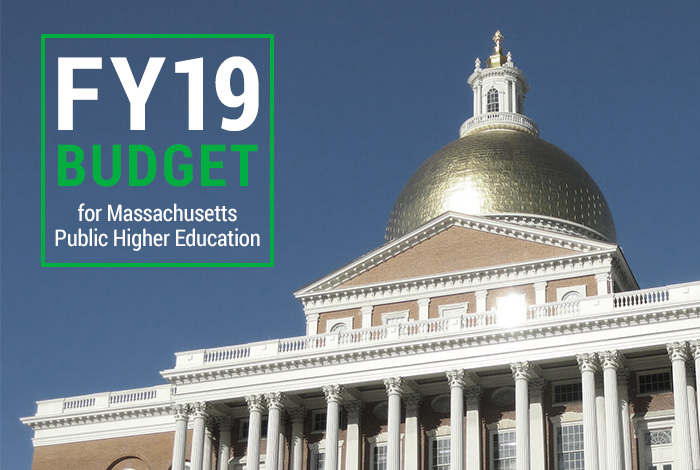
Tom Simard, DHE’s Deputy Commissioner for Administration & Finance, highlights key investments in higher education from the Governor’s $40.9 billion “House 2” budget proposal
The most noteworthy of Governor Charlie Baker and Lt. Governor Karyn Polito’s proposed recommendations is an historic $7.1M increase to the general scholarship line item, effectively doubling the funding from the MASSGrant program for degree-seeking community college students. The Governor’s proposal would provide last dollar aid to close the unfunded gap for students’ tuition and fee costs after accounting for expected family contributions and all state and federal grant assistance and waivers. This proposal closely mirrors the recommendation approved by the Board of Higher Education in December to increase student financial aid in its budget request for FY19.
House 2 also includes an additional $3 million to support Early College initiatives that will focus on engaging student populations who are underrepresented in college and encourage their enrollment in the STEM fields. Collectively, these investments, along with MassTransfer and full funding for the Commonwealth Commitment program, represent a substantial commitment to address the key strategic priorities of the BHE, including promoting access, opportunity, affordability, and student success.
The budget also includes an additional $10M in funding to distributed to public higher education campuses based on a formula that measures their progress on a number of goals and metrics. In addition, the Performance Incentive Fund is increased by $1.5M. Together, these programs seek to align funding with performance-based outcomes and will help scale best practices across the system.

“There’s no doubt that Governor Baker’s proposal will increase the number of people going to college in Massachusetts. We’ve learned that many potential community college students—even those who have full Pell Grants—wind up attending no college at all because they can’t cover that last remaining portion of tuition and fees. By covering this gap, the Governor’s proposal will place college, a job, and a bright future within the firm grasp of thousands more people, instead of achingly out of reach.” Tweet

“On behalf of Massachusetts’ fifteen community colleges, we are thrilled that Governor Baker has proposed an additional $7.1 million in MASSGrant aid. Not only will the increased funding provide opportunities for more individuals to attend college throughout the Commonwealth, but also by expanding aid to part-time attendees, the Governor recognizes that many students are balancing home, work and other life obligations. This financial support will allow those students to continue their education at their pace. Throughout Massachusetts, the community college system plays a significant role in educating our residents, accounting for 52% of the undergraduate credit enrollment in the Commonwealth. We see this additional funding as a win-win as it will expand access to high-quality education for individuals while also increasing the pool of skilled workforce for employers.” Tweet

“It’s a start to see that the Governor is interested in looking at higher education within the budget he sent out. I see the Governor’s proposed increase in financial aid as a small step toward improving the overall budget for higher education. But since 2001 public funding for higher education has decreased overall by 14%. As the Governor’s budget moves to the legislature, I challenge our representatives to learn more about the constant battles students face and to take time to meet with them to directly hear their concerns about being able to afford degrees from public colleges and universities.” Tweet

“Contributions to support students have impacts that reach years into our future and can potentially shape our workforce. Although I’m glad to see some steps being taken to address the financial need of some students, a more comprehensive plan for the way ahead is necessary. Costs to run these public institutions are rising and landing on the shoulders of students. Unless the Legislature acts, Massachusetts runs the risk of stifling the progress of our future doctors, engineers, educators and other contributors to society. An investment in higher education is an investment in the future of our state.” Tweet
See Also: “Reaching Higher for Higher Ed,” blog post by Dr. Lane Glenn, President, Northern Essex Community College
The Legislature will be next to release their budget proposals, with the House Ways & Means version expected in mid-April and the Senate Ways & Means version expected in mid-May.